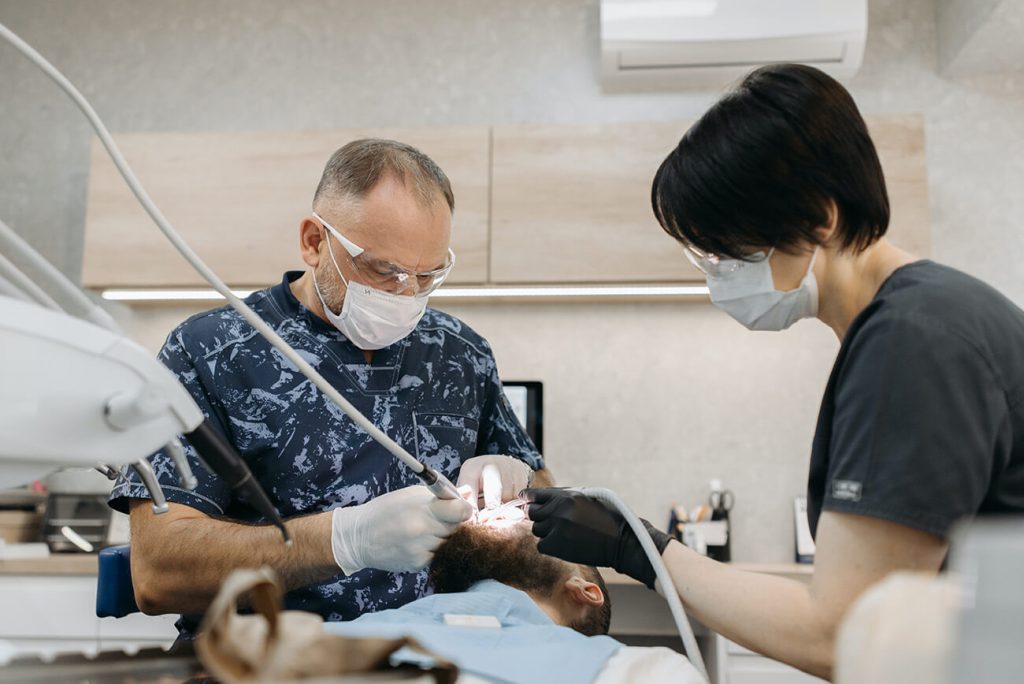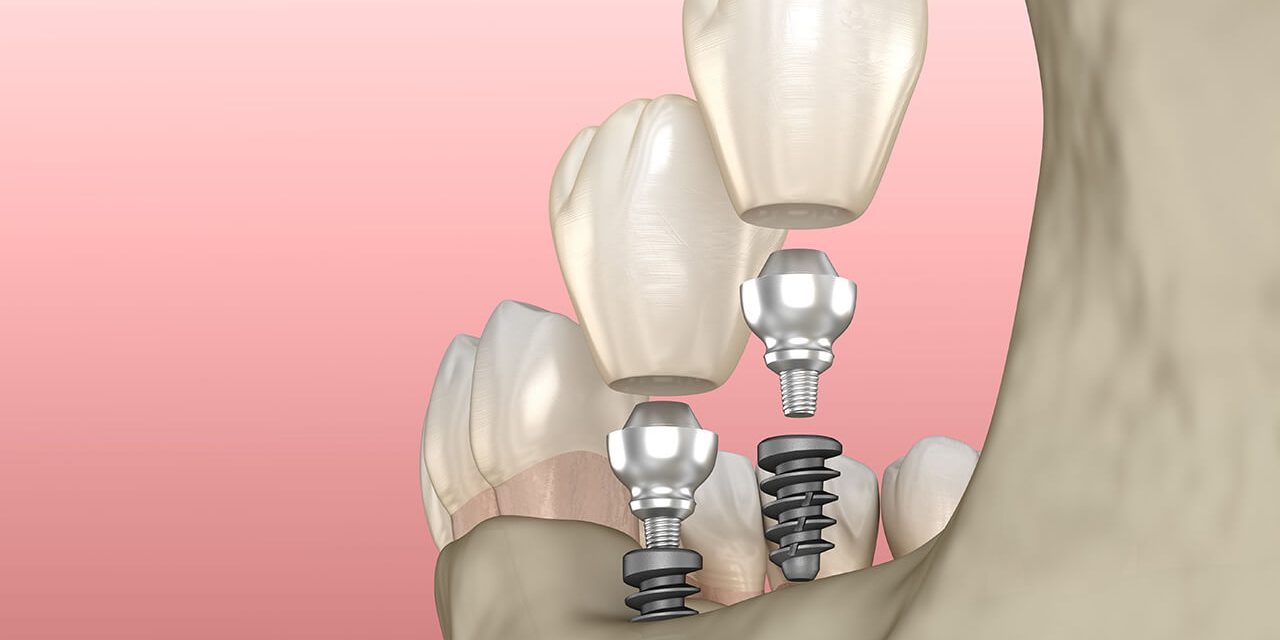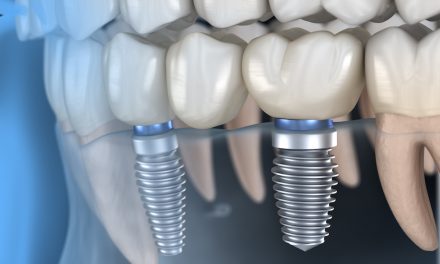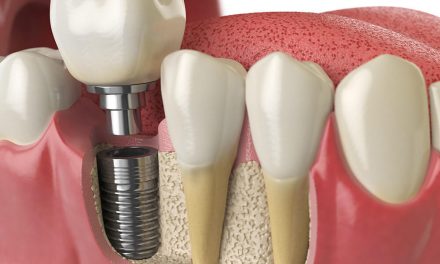How long will my dental implants last? We hear this question so often. To ensure that your new, teeth last as long as possible, good care is important. But how can you clean your implants and dentures optimally? NextSmile spoke with Dr. Wilson, an expert in dental implants. And here we will tell you how you can clean your implants like a professional!
The Key facts:
- Dental implants need to be cleaned regularly to avoid bacterial inflammation around the implant.
- The greatest danger to the retention of dental implants is peri-implantitis (similar to periodontitis on natural teeth).
- Cleaning your implants requires experience and requires special procedures. Prophylactic staff in the dental practice will clean implants with special aids.
Why do dental implants and dentures need to be cleaned?
With regular prophylaxis at the dentists, chronic inflammation and its accompanying symptoms are recognized early. The professional removal of bacterial deposits on the implant surface is an important part. Thus, the cleaning process done by the specialists should take place regularly. Part of this regular appointment should also be the examination and documentation of the jawbone condition.
Modern prophylaxis concepts include an individual health plan for teeth and dentures. The goal: to recognize potential risks early, to avoid diseases and to keep the often expensive dentures intact for as long as possible.
These factors are critical to long-term success of dental implants:
- The prosthetic restoration should be of high quality.
- The implant must grow in healthy and without inflammation.
- The teeth must remain healthy.
- The diet should be balanced and healthy.
- Best not to smoke!
However, risks and complications can also arise if you neglect your regular check-ups in the dental practice and/or your oral hygiene.
Peri-implantitis puts the dental implant at risk
Peri-implantitis, the inflammation and loss of bone around the implant, is similar to the periodontitis on the natural tooth. Both diseases are caused by bacteria. Thus, an untreated periodontitis may also pose risks for an implant.
In peri-implantitis, just as in periodontal disease, the jawbone recesses. The implant loses its hold and loosens. In fact, peri-implantitis is the most common cause of implant loss. If you notice one of the following warnings, you should make an appointment with the dentist immediately.
- Severe bleeding during teeth cleaning
- Pus formation around the dental implant
- Reddish colored gums around the implant
At least twice a year, patients should set aside time for a check-up appointment in their calendar.
Tips from the professional: What dental implants need in order to last a long time
Dental hygienist Dr. Wilson explains why everyone should have their implants professionally cleaned. In addition, the two prophylaxis professionals give tips for implant care in front of the bathroom mirror.

How does the implant cleaning process in the dental practice differ from the usual professional teeth cleaning?
Dr. Wilson: “If a patient has dental implants, we naturally take this into account during the professional teeth cleaning process. Even with high-quality implant restoration, there can be areas which you cannot reach yourself as the patient. That is our job! Plaque in inaccessible areas of the implant can only be completely removed in a dental practice.”
Are there special devices for cleaning implants?
Dr. Wilson: “Yes, we only use devices made of synthetic material. These materials are more flexible than metal and are therefore specially gentle for cleaning the dental implant. Cleaning with ultrasonic devices requires special carbon attachments.”
What exactly does typical implant prophylaxis look like?
Dr. Wilson: “The treatment is individually tailored to each patient:
- We measure the depth of the tooth pockets around the dental implants and compare the measurements from the previous treatment. This is how we determine whether or not the condition of the teeth supporting system has changed somewhat.
- We clean the surface of the dental implants with a water jet device and remove plaque in places that cannot be reached with a toothbrush.
- By polishing the surface of the teeth and dentures with a special paste, we ensure that bacteria builds up less rapidly.”
How often should an implant patient come to the dental practice for a check-up?
Dr. Wilson: “In addition to regular cleaning appointments, check-up appointments with the dentist are important in order to maintain the durability and lifespan of the dental implants. At least twice a year, patients should set aside time for a check-up appointment in their calendar. The appointments should be frequent after an implantation in order to optimize the healing process of the artificial tooth roots.”
What can each patient do for a healthy implant?
Dr. Wilson: “A lot! And it’s not complicated at all.
- Patients should carefully clean the implant. We recommended buying a soft toothbrush and using a toothpaste with just a few cleaning bodies. We call it a non-abrasive toothpaste.
- In addition to brushing your teeth, cleaning the spaces in between the teeth with interdental brushes is also very important. We usually show our patients how to clean with interdental brushes in order to get the best results.
- In our dental practice, we make sure that whatever plaque is left despite your good dental care is removed by our professionals.”
If you want to enjoy your new life with dental implants, it’s important you make use of the support offered by your dentist’s office.
Photo: Pavel Danilyuk from Pexels





